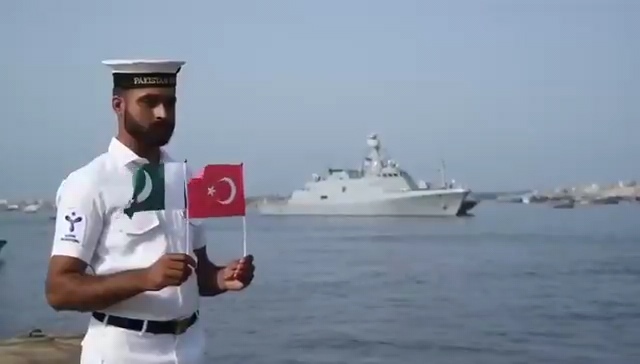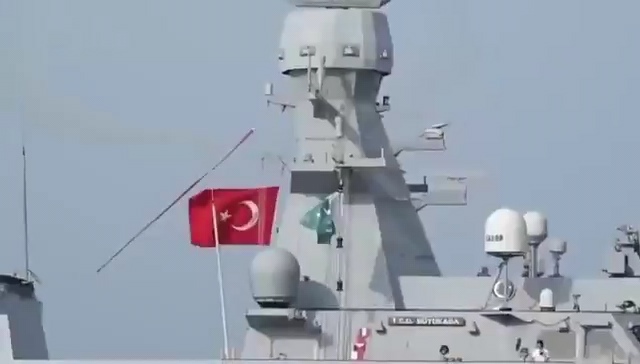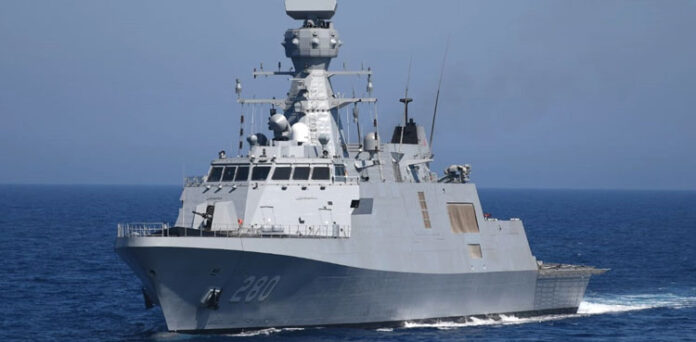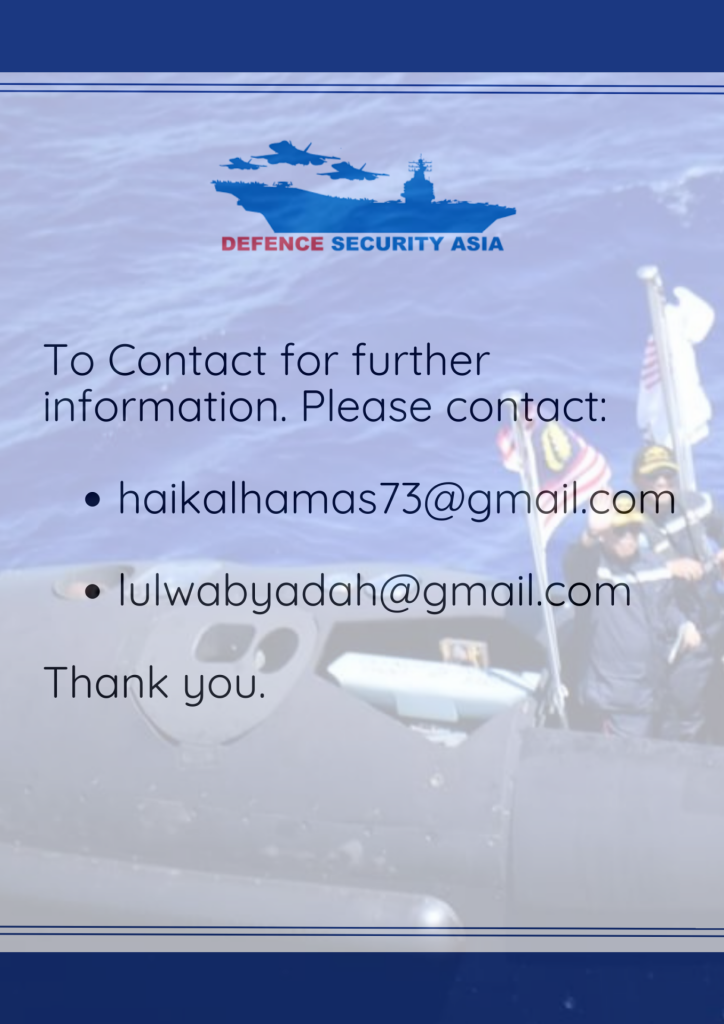(VIDEO) Turkish Warship Docks in Karachi Amid India-Pakistan War Fears: Strategic Solidarity or Military Signal ?
The arrival of the advanced Turkish warship occurs as Islamabad and New Delhi edge dangerously close to open conflict following a deadly attack in Pahalgam, Jammu and Kashmir, that claimed 26 lives—an incident for which India squarely accuses Pakistan.
(DEFENCE SECURITY ASIA) – In a highly symbolic display of bilateral solidarity and defence diplomacy, the Turkish Navy’s Ada-class anti-submarine warfare corvette, TCG Büyükada, has arrived at the Port of Karachi for a scheduled goodwill visit amid rising tensions between nuclear-armed neighbours Pakistan and India.
The arrival of the advanced Turkish warship occurs as Islamabad and New Delhi edge dangerously close to open conflict following a deadly attack in Pahalgam, Jammu and Kashmir, that claimed 26 lives—an incident for which India squarely accuses Pakistan.
The Pakistan Navy’s Directorate-General of Public Relations (DGPR) confirmed that TCG Büyükada was ceremonially received by senior officers and personnel of the Pakistan Navy upon entering Karachi, underscoring the deepening maritime partnership between Ankara and Islamabad.
“During its stay in Karachi, the crew of TCG Büyükada will engage in a series of professional interactions with Pakistan Navy personnel,” the DGPR stated.
The visit, part of a broader defence engagement program, is aimed at strengthening inter-naval understanding and cooperation through structured engagements, interoperability exercises, and knowledge exchanges.
“The goodwill visit of TCG Büyükada stands as a testament to the ever-strengthening maritime collaboration between Pakistan and Türkiye,” the DGPR added.
The statement further emphasized, “It reflects the deep-rooted mutual trust and strategic partnership between the two brotherly nations, anchored in centuries-old historical and cultural ties.”
Video Player
00:00
00:00
Both countries maintain a robust defence alliance with expanding diplomatic cooperation and regularly conduct joint military exercises, naval exchanges, and weapons development programs, positioning themselves as steadfast allies in a shifting global order.
Rear Admiral Zeki Aktürk, Head of Public Affairs and Media for Türkiye’s Ministry of National Defence, earlier announced that the warship would take part in the Langkawi International Maritime and Aerospace Exhibition (LIMA 2025), with official stopovers in Oman and Pakistan en route.
“In addition to carrying out various operational roles, the Turkish Armed Forces continue uninterrupted training and exercises to enhance operational readiness, deterrent capability, and professional excellence,” Admiral Aktürk affirmed.
TCG Büyükada (F-512), the second ship in Türkiye’s indigenous Ada-class, is a frontline asset in the country’s MILGEM (National Ship) program and is optimised for anti-submarine warfare, maritime patrol, and surface combat missions.
The vessel is named after Büyükada, the largest of the Princes’ Islands in the Sea of Marmara, near Istanbul—a name that carries historical and strategic maritime significance for the Turkish Navy.
Constructed at the Tuzla Naval Shipyard in Istanbul, Büyükada was laid down in January 2008, launched in September 2011, and formally commissioned into service on 27 September 2013, marking a key milestone in Türkiye’s shipbuilding autonomy.
Its presence in Karachi at a time of regional turbulence is expected to cause unease in New Delhi, which perceives Ankara’s growing defence alignment with Islamabad as a threat to its strategic calculus in South Asia.

Türkiye is widely regarded as one of Pakistan’s most reliable defence partners and a major source of advanced weaponry, with its defence exports to Islamabad covering naval platforms, unmanned systems, and aerospace technologies.
The timing of the visit is particularly sensitive as speculation swirls around recent Turkish military activity in the region, including the controversial arrival of a C-130E Hercules military transport aircraft from Türkiye in Karachi, reportedly carrying undisclosed cargo.
Open-source intelligence (OSINT) trackers documented the Turkish aircraft flying over the Arabian Sea before landing in Pakistan on April 28, fuelling unverified claims of a covert arms transfer amid the deteriorating regional security environment.
Indian media outlets, amplifying concerns, alleged that as many as six Turkish C-130E aircraft landed in Pakistan—a claim that triggered widespread debate on Platform X and among regional analysts, military strategists, and geopolitical observers.
The Turkish Presidency’s Directorate of Communications swiftly moved to contain the speculation, issuing a denial that read: “A cargo plane from Türkiye landed in Pakistan for refueling. It then continued on its route. Speculative news made outside of the statements of authorized persons and institutions should not be relied upon.”
Despite the denial, Türkiye’s growing military footprint in Pakistan is unmistakable, with a series of high-impact defence collaborations reshaping the country’s capabilities across air, sea, and land domains.

Among the most notable acquisitions are four MILGEM-class corvettes, designated Babur-class in Pakistan, co-developed by Türkiye’s STM and Karachi Shipyard & Engineering Works (KS&EW), with two vessels built domestically and two at Turkish facilities.
In a bold aerospace partnership, Ankara and Islamabad are co-developing the fifth-generation TAI TF Kaan fighter jet, with plans for joint production facilities on Pakistani soil—signalling a strategic leap in regional air power collaboration.
The Pakistan Air Force (PAF) has also integrated Türkiye’s combat-proven Bayraktar TB2 unmanned combat aerial vehicles (UCAVs) into its operational fleet, reinforcing its ISR and strike capabilities.
Satellite imagery from April 2022 confirmed the presence of TB2s, associated ground control stations, and support equipment at PAF Murid Air Base, with analysts estimating between two to six platforms currently in service.
In September 2022, the TB2 was prominently featured in a PAF air defence drill, affirming its full operational deployment within Pakistan’s military architecture.
The drone has been outfitted with indigenous laser-guided BARQ missiles and Turkish-made MAM-L precision munitions, significantly enhancing its ability to conduct precision strikes in contested or denied environments.

The integration of the Bayraktar TB2 into Pakistan’s strategic toolkit signals a broader shift toward agile, networked warfare, allowing the PAF to project power with real-time responsiveness and reduced risk to manned assets.
Pakistan and Türkiye’s defence ties are deeply embedded in a broader relationship underpinned by shared cultural, religious, and geopolitical values, increasingly reflected in aligned foreign policy positions on contentious regional issues.
Türkiye has consistently voiced support for Pakistan’s position on Kashmir, a move that has irked Indian leadership and widened the strategic fault lines between Ankara and New Delhi.
The growing convergence of defence policy, joint exercises, military exchanges, and technology sharing has drawn serious attention from Indian defence circles, who view the Türkiye-Pakistan alliance as a counterbalance to India’s regional ambitions.
Just days ago, a senior Turkish military delegation led by Lieutenant General Yasar Kadioglu, Chief of Military Intelligence, paid a courtesy visit to Pakistan’s Air Chief Marshal Zaheer Ahmed Baber Sidhu, reinforcing the strategic depth of the bilateral military relationship.

For New Delhi, Türkiye’s growing tilt toward China and its open criticism of India’s domestic policies only deepens concerns that the Türkiye-Pakistan axis could disrupt the fragile balance of power in South Asia and the broader Islamic world.
In an era of increasingly multipolar geopolitics and regional realignments, Türkiye’s assertive naval diplomacy—exemplified by TCG Büyükada’s visit—may well be read not merely as a gesture of friendship, but as a calculated signal to regional and global observers.
— DEFENCE SECURITY ASIA



